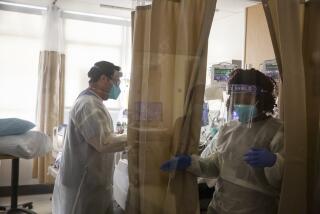You’d think that overworked medical residents would welcome new limits on their work hours, but ...
- Share via
Ever since college student Libby Zion died while under the care of overworked, overtired, undersupervised medical residents at New York Hospital, there has been a push to limit the duty hours of these doctors-in-training.
In the 26 years since that fateful night, the Accreditation Council for Graduate Medical Education (better known by the acronym ACGME) has put restrictions on the number of hours residents may work per week (the current maximum is 80) and the length of any single shift (the current maximum is 30, and it will drop to 16 next year). The rules also mandate at least one day off per week and minimum amounts of time off between shifts.
You would think residents would welcome these changes, both for improving their work experience in the hospital and for providing a welcome break during a stressful period in their training. But according to a new survey of more than 2,500 residents in 75 training programs across the country, that feeling was far from universal.
Only 37% of those who responded said they thought the work-hour limits going into effect next year would improve patient safety, and 24% think it will improve their ability to learn things during residency. That compares with 36% who thought the limits would not improve patient safety and 54% who thought it would do nothing to help their educational experience. (About one-quarter of respondents were neutral on those questions.)
Some more discouraging news for advocates of duty hour restrictions:
- 33% of residents thought the new limits would improve the quality of patient care, versus 41% who didn’t
- 35% thought the limits would result in a shorter work week, versus 40% who didn’t
- 13% thought the limits would make them more prepared to become senior residents, vs. 63% who didn’t
On the bright side, 51% of residents agreed that the new rules would impove their “quality of life and well-being.” However, 28% disagreed with that notion, and an additional 21% were neutral on the matter.
The survey included residents in a range of specialties – including internal medicine, pediatrics, surgery, anethesiology and obstetrics & gynecology – who were in their first through seventh year of training. It was conducted by three doctors at Brown University’s Warren Alpert Medical School in Providence, R.I. The results appear in Thursday’s edition of the New England Journal of Medicine.
RELATED: PRO/CON: The effects of long work hours on medical residents







